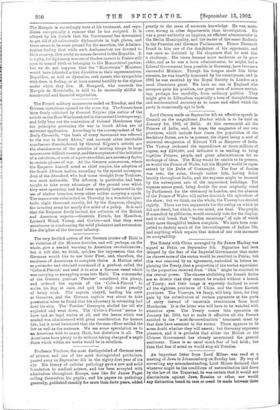The French military manceuvres ended on Tuesday, and the German
operations opened on the same day. The former have been freely criticised by General Negiier (the author of the article on the Boer War translated in the current Contemporary), and fully bear out the contention of Colonel Henderson that the principles governing the war in South Africa are of universal application. According to the correspondent of the Daily Chronicle, "the basis of every movement was referred to the war in South Africa," and amongst other inevitable conclusions (foreshadowed by General Negrier's article) are the abandonment of the practice of moving troops in large masses over difficult country, and the acceptance of the initiative of a subaltern, or even of a private soldier, as a necessary factor in certain phases of war. At the German manceuvres, where the Emperor himself acted as chief umpire, the adoption of the South African tactics, according to the special correspon- dent of the Standard, who had come straight from Toulouse, was most noticeable. The infantry, in particular, had been taught to take every advantage of the ground over which they were operating, and had been specially instructed in the use of shelter trenches, every other soldier carrying a spade. The manceuvres culminated on Thursday in a wonderful spec- tacle, eight thousand cavalry, led by the Emperor, charging the invading army for nearly five miles at a gallop. It is said that the Emperor freely invited the criticism of the British and American experts—Generals French, Ian Hamilton, Leonard Wood, Young, and Corbin—and that they were unanimous in condemning the solid phalanxes and automaton- like discipline of the German infantry.






































 Previous page
Previous page